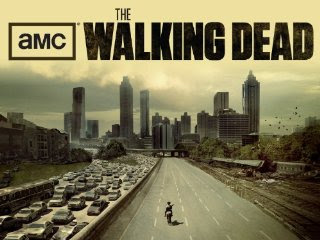A few weeks ago my favorite TV show started a new season, The Walking Dead. It's a show about people surviving in a world of zombies. It may not seem that appealing to most folks, but the show is more about the relationships between the survivors than about gore. In the opening episode a new minor character was explaining his view of friendship in light of the zombie apocalypse. He said, "I don't have any friends. I mean I know people, they are just assholes I stay alive with. Is that other woman your friend? I used to have them, we used to watch football on Sundays. Went to church. I know I did, but I can't picture it anymore" (AMC's The Walking Dead, season 5 episode 1). This clip asks us in our current context, that is not ravaged by zombies, if we have a community as well or if we have people we just survive with. While we can take many different approaches to this question, it seems to me that German theologian Dietrich Bonhoeffer offers us a unique perspective on what it means to be community as Christians in his work Life Together.
“Christian community means community through Jesus Christ and in Jesus Christ. There is no Christian community that is more than this, and none that is less than this. Whether it be a brief, single encounter or the daily community of many years, Christian community is solely this. We belong to one another only through and in Jesus Christ.”
– Bonhoeffer, Life Together, 30
– Bonhoeffer, Life Together, 30
This passage from the opening chapter of Life Together illustrates Bonhoeffer’s main thrust of his definition of community that it can only exist through the mediation of Jesus Christ. He expands on this point in the following pages by describing Christians as needing others for the sake of Christ, a Christian comes to others only through Christ, and finally that we are united with Christ in eternity (Bonhoeffer, Life Together, 30-31). This threefold description of what it means to be in Christian community begins with our justification. It is not done by our own merits, but through Jesus Christ alone (Bonhoeffer, Life Together, 31).
This means that in the Christian community there is a continual movement of death and resurrection. The Holy Spirit works in us from the outside, deconstructing us and our self-made constructions, and giving us new life in Christ. It can then be said that Jesus on the cross is the primary moment of deconstruction, it is the moment in which we are told we do not save ourselves because it is Christ on the cross who does. Such a realization creates community because it relieves us from the expectation of performance before God, or climbing the spiritual ladder, it frees us to serve our neighbor.
From this comes Bonhoeffer’s second point, “…a Christian comes to others only through Jesus Christ” and our efforts to do so on our own are failures because we run into our own egos so we rely only on Christ to mediate our knowing of the other (Bonhoeffer, Life Together, 32). This means that we can only experience others from Christ’s actions, not our own. We are then opened up to live, love, and serve with and for others. We are once again freed from the expectation of serving according to our egos and we are shown a way of being through Jesus’ ministry and the Holy Spirit stirring within us.
Bonhoeffer’s final point of defining a Christian community relates to the person of Jesus Christ and how we are united with him. He writes, “Third, when God’s Son took on flesh, he truly and bodily, out of pure grace, took on our being, our nature, ourselves…Wherever he is, he bears our flesh, he bears us. And, where he is, there we are too…” (Bonhoeffer, Life Together, 32). With this description, community becomes much more than a gathering of people, community becomes the body of Christ that lives out the life of Christ in the world. Such a community embraces the costly grace of God, clamors for the theology of the cross and resists the theology of glory, serves the neighbor, and engages life in all of its beauty and messiness.
Indeed we seek relationships out of self-serving goals (like this character's noting he gathers with people to simply survive), so it is God who mediates community for us showing us that community is not about physical connection, but instead a spiritual one. Such a community is about the Word of God in Jesus Christ, truth, light, service, and where the Spirit and Word of God in Jesus Christ rule (Bonhoeffer, Life Together, 38-40). This is what Bonhoeffer envisions as being the Christian community, the spiritual community that is radically active in the world.
While we agree with Bonhoeffer and admit that this is what we strive for, we know that it is not necessarily reality because it is a hard calling! Yet, Bonhoeffer further challenges us, “Christian community is not an ideal we have to realize, but rather a reality created by God in Christ in which we may participate. The more clearly we learn to recognize that the ground and strength of all our community is in Jesus Christ alone, the more calmly we will learn to think about our community and pray and hope for it” (Bonhoeffer, Life Together, 38). This makes Christian community not something that humans must meet as if it were a law, it is the opposite. We enter into community simply by the free grace, faith, and justification from God. We are wholly undeserving of these things, but we are given it. It is God who created us to be in community and provides us such an opportunity.
Real community then is about embracing the struggle of everyday life while simultaneously living out the gospel message. For the characters in The Walking Dead, their morals and their underlying discipleship to God is tested daily by decisions to act mercifully or selfishly, emotionally or spiritually, peacefully or violently. And in these decisions their view of community and communal reality is challenged. Do we welcome this person into our group out of gain because of their skills? Or do we welcome them because that is what we do, extending hospitality and love in a dangerous world?
This reality is not so far from us is it? My wife has a thousand and one friends whom she would consider real community because they do just about anything for each other and build each other up out of love and live in service to the world. But I find myself having far fewer friends when I look at my real community. There are of people I stay alive with and know, but not many that fit into Bonhoeffer's vision of community. Now I do not lament over this, rather it opens up a perspective about how we all interact in the world and challenges us to live out of thanksgiving to God for giving us such an opportunity. Where do you find yourself in this spectrum of community? Are your friends plentiful or just enough? Do you have real community or ones that you just live with?
May you rethink who your community is and in the process find God calling your community to more than survival.
Peace,
Tom





